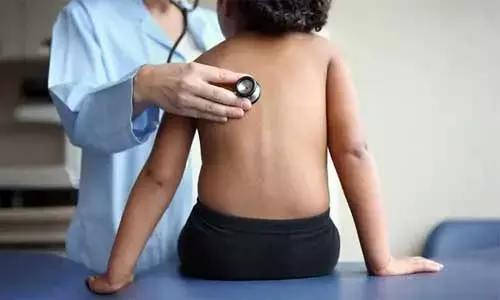- Home
- Medical news & Guidelines
- Anesthesiology
- Cardiology and CTVS
- Critical Care
- Dentistry
- Dermatology
- Diabetes and Endocrinology
- ENT
- Gastroenterology
- Medicine
- Nephrology
- Neurology
- Obstretics-Gynaecology
- Oncology
- Ophthalmology
- Orthopaedics
- Pediatrics-Neonatology
- Psychiatry
- Pulmonology
- Radiology
- Surgery
- Urology
- Laboratory Medicine
- Diet
- Nursing
- Paramedical
- Physiotherapy
- Health news
- Fact Check
- Bone Health Fact Check
- Brain Health Fact Check
- Cancer Related Fact Check
- Child Care Fact Check
- Dental and oral health fact check
- Diabetes and metabolic health fact check
- Diet and Nutrition Fact Check
- Eye and ENT Care Fact Check
- Fitness fact check
- Gut health fact check
- Heart health fact check
- Kidney health fact check
- Medical education fact check
- Men's health fact check
- Respiratory fact check
- Skin and hair care fact check
- Vaccine and Immunization fact check
- Women's health fact check
- AYUSH
- State News
- Andaman and Nicobar Islands
- Andhra Pradesh
- Arunachal Pradesh
- Assam
- Bihar
- Chandigarh
- Chattisgarh
- Dadra and Nagar Haveli
- Daman and Diu
- Delhi
- Goa
- Gujarat
- Haryana
- Himachal Pradesh
- Jammu & Kashmir
- Jharkhand
- Karnataka
- Kerala
- Ladakh
- Lakshadweep
- Madhya Pradesh
- Maharashtra
- Manipur
- Meghalaya
- Mizoram
- Nagaland
- Odisha
- Puducherry
- Punjab
- Rajasthan
- Sikkim
- Tamil Nadu
- Telangana
- Tripura
- Uttar Pradesh
- Uttrakhand
- West Bengal
- Medical Education
- Industry
Kids frequently receive Opioids and steroids for pneumonia and sinusitis during ED visits

USA: Children receive opioid and steroid prescriptions for pneumonia or sinusitis at a higher frequency in the emergency department (ED) than in the ambulatory settings, according to a recent study published in the AAP journal Pediatrics.
Karina G. Phang, Geisinger Medical Center in Danville, Pa, and colleagues compared the frequency of opioid and corticosteroid prescriptions dispensed for children with pneumonia or sinusitis visits on the basis of the location of care.
They evaluated 2016 South Carolina Medicaid claims data for 5 to 18 years olds with pneumonia or sinusitis. Visits were associated with 1 of 3 locations: the emergency department (ED), urgent care, or the ambulatory setting. A total of 31 838 children were included in the study.
Key findings of the study include:
- Pneumonia visits were more often linked to an opioid prescription in the ED (34 of 542 [6.3%]) than in ambulatory settings (24 of 1590 [1.5%]) and were more frequently linked to a steroid prescription in the ED (106 of 542 [19.6%]) than in ambulatory settings (196 of 1590 [12.3%];).
- Sinusitis visits were more often linked to an opioid prescription in the ED (202 of 2705 [7.5%]) than in ambulatory settings (568 of 26 866 [2.1%]) and were more frequently linked to a steroid prescription in the ED (510 of 2705 [18.9%]) than in ambulatory settings (1922 of 26 866 [7.2%]).
- In logistic regression for children with pneumonia, the ED setting was associated with increased odds of receiving an opioid (adjusted odds ratio [aOR] 4.69) or steroid (aOR 1.67).
- Patients with sinusitis were more likely to be prescribed opioids (aOR 4.02) or steroids (aOR 3.05) in the ED than in ambulatory sites.
"School-aged children received opioid and steroid prescriptions for pneumonia or sinusitis at a higher frequency in the ED versus the ambulatory setting," concluded the authors.
The study, "Opioids or Steroids for Pneumonia or Sinusitis," were published in the AAP journal Pediatrics.
DOI: https://doi.org/10.1542/peds.2019-3690
Dr Kamal Kant Kohli-MBBS, DTCD- a chest specialist with more than 30 years of practice and a flair for writing clinical articles, Dr Kamal Kant Kohli joined Medical Dialogues as a Chief Editor of Medical News. Besides writing articles, as an editor, he proofreads and verifies all the medical content published on Medical Dialogues including those coming from journals, studies,medical conferences,guidelines etc. Email: drkohli@medicaldialogues.in. Contact no. 011-43720751


